
|
|
|
|
|
|
|
|
|
|
|
|
|
(1984) Director: Andy
Anderson
There is a problem in movie making when it comes to filming a screenplay that is mostly or completely centered around a current fad or one aspect of modern technology. It's pretty obvious - in just a short while, the fad or that technology will be obsolete, and not only will that thing have been replaced with some other gimmick or scientific breakthrough, society's viewpoint on everything will have changed as well. As a result, we look back on those two Lambada movies as if they were made by madmen, and we giggle at how the high tech weaponry in Megaforce looks so goofy, as if those so-called professional soldiers were playing with children's toys in a sandbox the size of a desert. I don't think there is any method to make sure (unless
maybe if you are making a period piece) every little thing in the movie
you're making won't look quaint (or worse) to future audiences, but I
think there are ways Those previous two paragraphs are more or less the Cliff Notes for this review, boiling down all the reasons why I despised the computer thriller Interface into one basic explanation. It's not really the fact that the technology in the movie is of the TRS-80 level that bothered me so much, but the lame presentation of this now clunky equipment - as well as the lame presentation of everything else. This movie is such a mess, it doesn't even seem to know what kind of movie it is supposed to be. Is it about students taking their cyber-oriented Dungeons & Dragons games way beyond simple fun and games? It is an action thriller centered around a secret society composed of computer vigilantes? Is it a comic mystery about a couple investigating a murder in the vein of The Thin Man's Nick and Nora? (That is, if Nick and Nora were constantly pissed and bickering at each other.) Well, it's all of that, and quite a bit more. No wonder the manager at my local video store didn't seem to know where to shelve it, since I found it in the horror section. Though considering the ghastly results of this mish-mash of genres, maybe it was in the correct place after all. All the events of the movie center around some college
campus in Texas. (And yes, this was indeed made in Texas - has this
state ever made any decent movies?) The opening sequence - a drug deal
interrupted by a masked paint-throwing prankster that has
inadvertently tragic results - serves no foreseeable consequence in the
future, except maybe to give Lou Diamond Phillips (in his first role,
credited as "Punk #1) his S.A.G. card. The next day, we meet Rex Hobson Fortunately, we start to get an idea of the plot
(finally) at this point, though strangely, the explanation is provided
by the supposedly clueless dean. Seems there might be some secret
society on campus that's messing with the administration's computers.
Though before he can explain further, he's called out of his office,
and we are left somewhat hanging still. Anyway, this society has just recently implemented a
vigilante agenda, and they commence doing things like blowing up a
prostitute in her hotel room (kind of overreacting, don't you think?)
and killing that aforementioned football jock by electrocuting him over
the phone lines when he takes a call (which may be ridiculous, but it
provides a good unintentional laugh.) Not long afterwards, Hobsen finds
out Bobby died in a car accident, and later in the day Bobby's widow
Amy (Lane) There are so many places where Interface
goes wrong - in fact, I can't recall anything of real significance done
with a minimum amount of competence. Actually, it's possible that we
might have been able to swallow a lot of these mistakes had just one
key ingredient - which carries most of that previously mentioned
attitude - been worked on, and that ingredient is the movie's
characters. To put it quite bluntly, they are dumb. Really dumb. They
never asking the glaringly appropriate questions for whatever situation
they may be in at the time, which, if answered, would speed the
investigation up quite a bit. Plus, they seem trapped in stereotypical
clichés, like the detective who appears later in the movie (always
wearing a trenchcoat) and constantly acts like an asshole for no
appropriate reason. To make matters worse, none of the actors seem to
be even trying to inject some intelligence with their acting; Davies,
for one, gives such an incompetent performance, he can't even gesture
or touch his face while talking in a convincing manner. The only thing
he seems to be trying to put in his performance is some "gay" and a
little Michael J. Fox, with bizarre UPDATE: Paul Becka sent this along: "I Enjoyed your review of the truly awful film Interface. Some facts about the film: Interface was produced entirely by the film program headed by Andy Anderson at the University of Texas at Arlington art department. I was a student there at the time, but was uninvolved (I auditioned for the role of 'Nerd' or something but was turned down). The film was scripted, acted and initially directed entirely by UTA students -- essentially a school project. When the student director apparently couldn't see it through Andy (who as you know later directed the well received Positive I.D.) took over the job. The film is notable not only for the cameo performance of Lou Diamond Philips, but also for being the first film of the successful TV actress Lauren Lane ('The Nanny') -- credited here as Laura Lane, a name already taken when she joined SAG." Check for availability on Amazon (VHS) See also: Robotrix, Terminal Justice, Year Of The Comet |
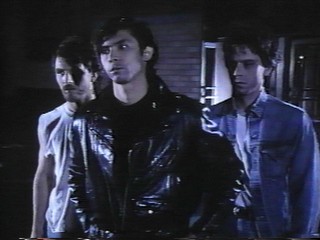 to at least minimize the dated feel. The
most important, I think, is attitude. What you have to do is
take the topic with just the right amount of seriousness. Look at Saturday
Night Fever and WarGames; though disco dancing
and 1983 computer technology have long disappeared from the real world,
people still watch these movies today. The approach to these movies was
neither campy nor ultra-serious - any of those approaches would have
resulted in the movies today being unwatchable to the point of
embarrassment.
to at least minimize the dated feel. The
most important, I think, is attitude. What you have to do is
take the topic with just the right amount of seriousness. Look at Saturday
Night Fever and WarGames; though disco dancing
and 1983 computer technology have long disappeared from the real world,
people still watch these movies today. The approach to these movies was
neither campy nor ultra-serious - any of those approaches would have
resulted in the movies today being unwatchable to the point of
embarrassment.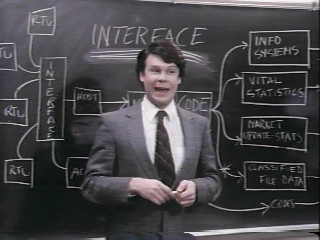 (Davies), a computer
professor at said college, trying to keep order in his classroom. He
asks the late-arriving George if he's seen Sidney. He doesn't know; in
fact, I don't think we ever meet Sidney. Meanwhile, elsewhere in the
college, some fellow named Bobby is making some money by changing
grades etc. with his hacking. His friend Teresa is concerned about his
hacking, but leaves it at that. Meanwhile, a friend of Bobby is
cornered by one of the campus' football players (whose advanced age has
left him with a severe case of receding hair), who wants his grades
changed. Bobby's friend is saved by a passing female student, who gets
her ass grabbed for her efforts. Later, Hobson chews out Bobby for not
grading some papers - though why Hobsen would want one of his students
to do that is not answered. Then later, the dean of the college uses
his helium voice to call Hobsen into his office. The first thing the
dean says is, "I just want to know what the hell is going on here!"
Hobsen, speaking for the audience, answers, "You and everyone else!"
(Davies), a computer
professor at said college, trying to keep order in his classroom. He
asks the late-arriving George if he's seen Sidney. He doesn't know; in
fact, I don't think we ever meet Sidney. Meanwhile, elsewhere in the
college, some fellow named Bobby is making some money by changing
grades etc. with his hacking. His friend Teresa is concerned about his
hacking, but leaves it at that. Meanwhile, a friend of Bobby is
cornered by one of the campus' football players (whose advanced age has
left him with a severe case of receding hair), who wants his grades
changed. Bobby's friend is saved by a passing female student, who gets
her ass grabbed for her efforts. Later, Hobson chews out Bobby for not
grading some papers - though why Hobsen would want one of his students
to do that is not answered. Then later, the dean of the college uses
his helium voice to call Hobsen into his office. The first thing the
dean says is, "I just want to know what the hell is going on here!"
Hobsen, speaking for the audience, answers, "You and everyone else!"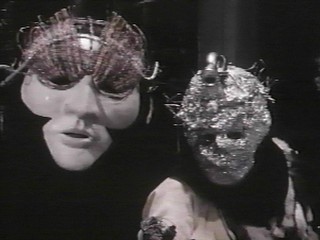 Later (a lot much
later than you'd both think and want), more pieces of the plot puzzle
start falling into place. Seems that there is indeed a secret computer
society on campus after all. Meeting in a disused campus basement room,
the members of the society give themselves hip nicknames like
"Manborn", "Olympius", and "Modem". They also disguise themselves with
outlandish masks and costumes (a knight's full chain mail and a plastic
mask, a dirty cloak and a mask completely made out of discarded
crumpled pieces of tin foil, etc.), and their masks have electronic
equipment that not only disguises their voices, but removes any
possible emotion and acting ability these actors might have had
ordinarily.
Later (a lot much
later than you'd both think and want), more pieces of the plot puzzle
start falling into place. Seems that there is indeed a secret computer
society on campus after all. Meeting in a disused campus basement room,
the members of the society give themselves hip nicknames like
"Manborn", "Olympius", and "Modem". They also disguise themselves with
outlandish masks and costumes (a knight's full chain mail and a plastic
mask, a dirty cloak and a mask completely made out of discarded
crumpled pieces of tin foil, etc.), and their masks have electronic
equipment that not only disguises their voices, but removes any
possible emotion and acting ability these actors might have had
ordinarily. 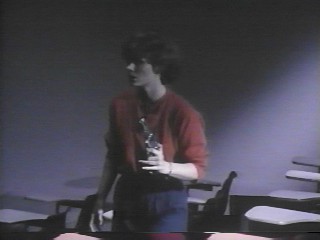 storms into Hobsen's office and
flat out accuses him of Bobby's murder. Why? Well... it's never
actually said why, but I think she suspects Hobsen because they
happened to spend each day in the same location. Though before she can
explain why she isn't accusing any of the other several hundred people
at the campus, she hears a cop coming to talk to Hobsen, so she escapes
through the ceiling. Yes. Later, she drops by Hobsen's home to accuse
him some more, but before she can begin to explain her deranged
actions, she hears the cop coming to visit Hobsen again. So without
another word, she escapes again. If you're wondering if she ever gets
around to explaining herself to Hobsen and then teaming up with him to
solve her husband's murder, the answer is yes.... eventually, though.
But since the plotting of that subsequent section is just as badly done
as what preceded it, I won't be surprised if you don't care for any
explanation.
storms into Hobsen's office and
flat out accuses him of Bobby's murder. Why? Well... it's never
actually said why, but I think she suspects Hobsen because they
happened to spend each day in the same location. Though before she can
explain why she isn't accusing any of the other several hundred people
at the campus, she hears a cop coming to talk to Hobsen, so she escapes
through the ceiling. Yes. Later, she drops by Hobsen's home to accuse
him some more, but before she can begin to explain her deranged
actions, she hears the cop coming to visit Hobsen again. So without
another word, she escapes again. If you're wondering if she ever gets
around to explaining herself to Hobsen and then teaming up with him to
solve her husband's murder, the answer is yes.... eventually, though.
But since the plotting of that subsequent section is just as badly done
as what preceded it, I won't be surprised if you don't care for any
explanation.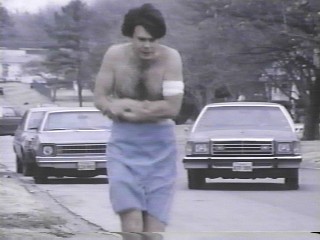 Every scene seems
to be shot either in one of Texas' seedier neighborhoods, or in quickly
set-dressed interiors of abandoned buildings, resulting in every shot
looking absolutely hideous to the eye. It also makes the high-tech
computer sequences look cheaper than they are, though they were not
much to begin with. In almost every scene involving a computer, you
never actually see what the character is doing. The character behind
the keyboard actually says out loud as to what he or she is doing with
the computer. The complexity of hacking or computers in general is
never even implied; these skills come across in this movie as
simplistic and something that anyone could do, so there's no suspense,
excitement, or even plain interest in these scenes. The best way
Anderson could have portrayed the power of computers using this
screenplay would have been to delete the word file the screenplay was
typed up in.
Every scene seems
to be shot either in one of Texas' seedier neighborhoods, or in quickly
set-dressed interiors of abandoned buildings, resulting in every shot
looking absolutely hideous to the eye. It also makes the high-tech
computer sequences look cheaper than they are, though they were not
much to begin with. In almost every scene involving a computer, you
never actually see what the character is doing. The character behind
the keyboard actually says out loud as to what he or she is doing with
the computer. The complexity of hacking or computers in general is
never even implied; these skills come across in this movie as
simplistic and something that anyone could do, so there's no suspense,
excitement, or even plain interest in these scenes. The best way
Anderson could have portrayed the power of computers using this
screenplay would have been to delete the word file the screenplay was
typed up in.